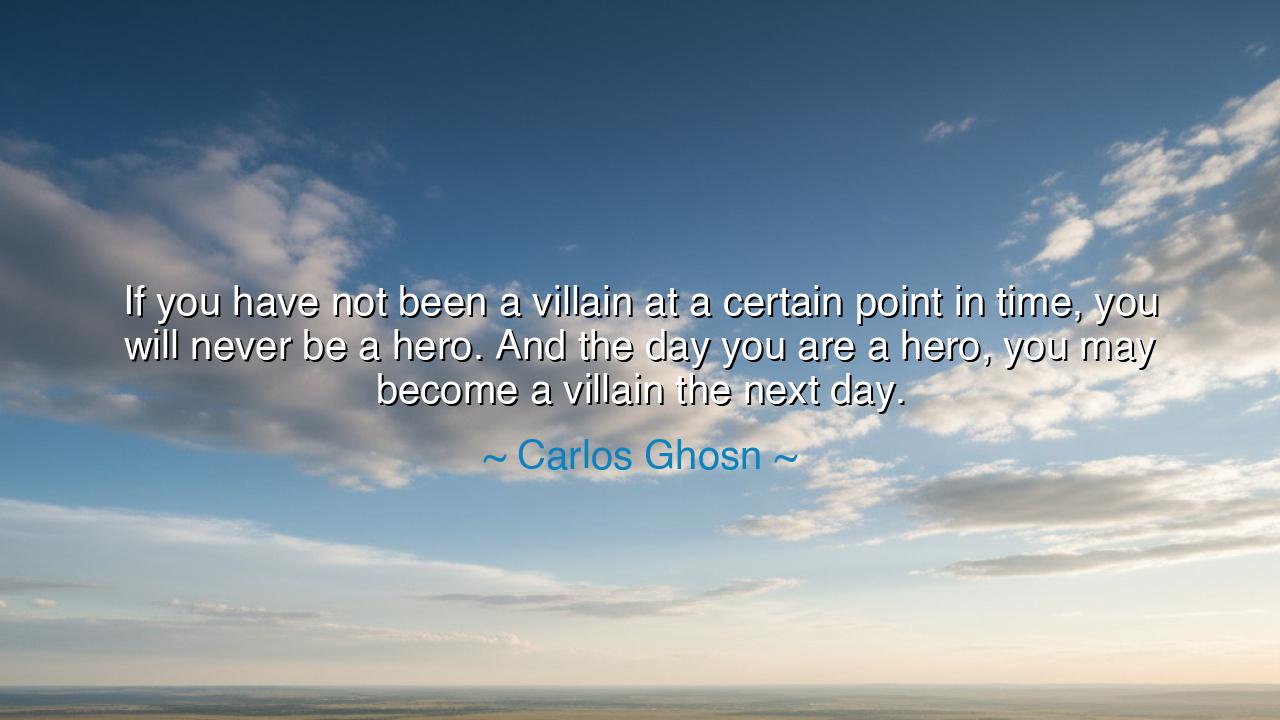
If you have not been a villain at a certain point in time, you
If you have not been a villain at a certain point in time, you will never be a hero. And the day you are a hero, you may become a villain the next day.






Carlos Ghosn, a man once celebrated as a savior of great companies and later pursued as a fugitive, uttered a truth forged in the fires of power and downfall: “If you have not been a villain at a certain point in time, you will never be a hero. And the day you are a hero, you may become a villain the next day.” In these words we find not only his personal reflection, but the timeless rhythm of how mankind perceives greatness and failure. For the line between hero and villain is not carved in stone, but shifts with circumstance, with perspective, and with time.
The meaning of this saying is that greatness is never pure, and glory always carries its shadow. The one who dares to act boldly, who strives to transform the world, will inevitably tread on the toes of others, and in their eyes he becomes a villain. Yet to others, the same deeds will shine as heroic. This duality is the fate of all who dare to rise above the ordinary. The hero and the villain are often the same person, seen from different windows of history.
History provides many witnesses to this truth. Julius Caesar was hailed as the savior of Rome by those who longed for order, yet branded as a tyrant by those who mourned the death of the Republic. In one breath, he was a hero, crowned with laurels; in the next, a villain, struck down by the daggers of the Senate. So too did Napoleon Bonaparte embody this paradox: a hero to his soldiers, who adored him for leading them to glory, but a villain to his enemies, who cursed his ambition that drenched Europe in blood.
The words of Ghosn also echo in the modern world. Consider Winston Churchill, who stood as a towering hero in the Second World War, rallying Britain with defiance and courage. Yet in his own nation, only a few years after victory, he was voted out of office, criticized for his rigid views and his failings in peace. The one who had saved a nation became, for many, a burden and even a villain. Thus, time itself transforms perception, proving the fluidity of honor and disgrace.
The lesson for us is twofold. First, we must accept that to strive for greatness is to risk condemnation. If you fear being misunderstood, or if you demand that all praise you, you will never act boldly enough to shape the world. To be a hero to some is to be a villain to others, for no action of magnitude leaves everyone untouched. Second, we must remain humble, for the crown of glory today may become the chain of blame tomorrow. Pride in heroism can blind a person, leading to arrogance, corruption, or blindness to their own flaws.
In practice, this means daring to act even when the world may judge harshly. Speak truth, even when it offends. Pursue justice, even when it unsettles. But also cultivate humility, remembering that your victories may not be eternal and your reputation may not remain unblemished. Do not seek only to be called a hero; seek to act with integrity, knowing that judgment shifts like the wind. In the end, what matters most is not the names others give you, but the truth of your own conscience.
Thus, children of tomorrow, heed this paradox: the hero and the villain are two faces of the same mask. Do not be destroyed by the scorn of others, nor intoxicated by their praise. Walk the path of courage, knowing that both condemnation and admiration may be your companions. For history will judge and re-judge you, but the eternal measure is whether you acted with conviction, with courage, and with integrity. And in this way, you will understand that even when cast as villain, you may still be shaping the world in the manner of a true hero.






AAdministratorAdministrator
Welcome, honored guests. Please leave a comment, we will respond soon